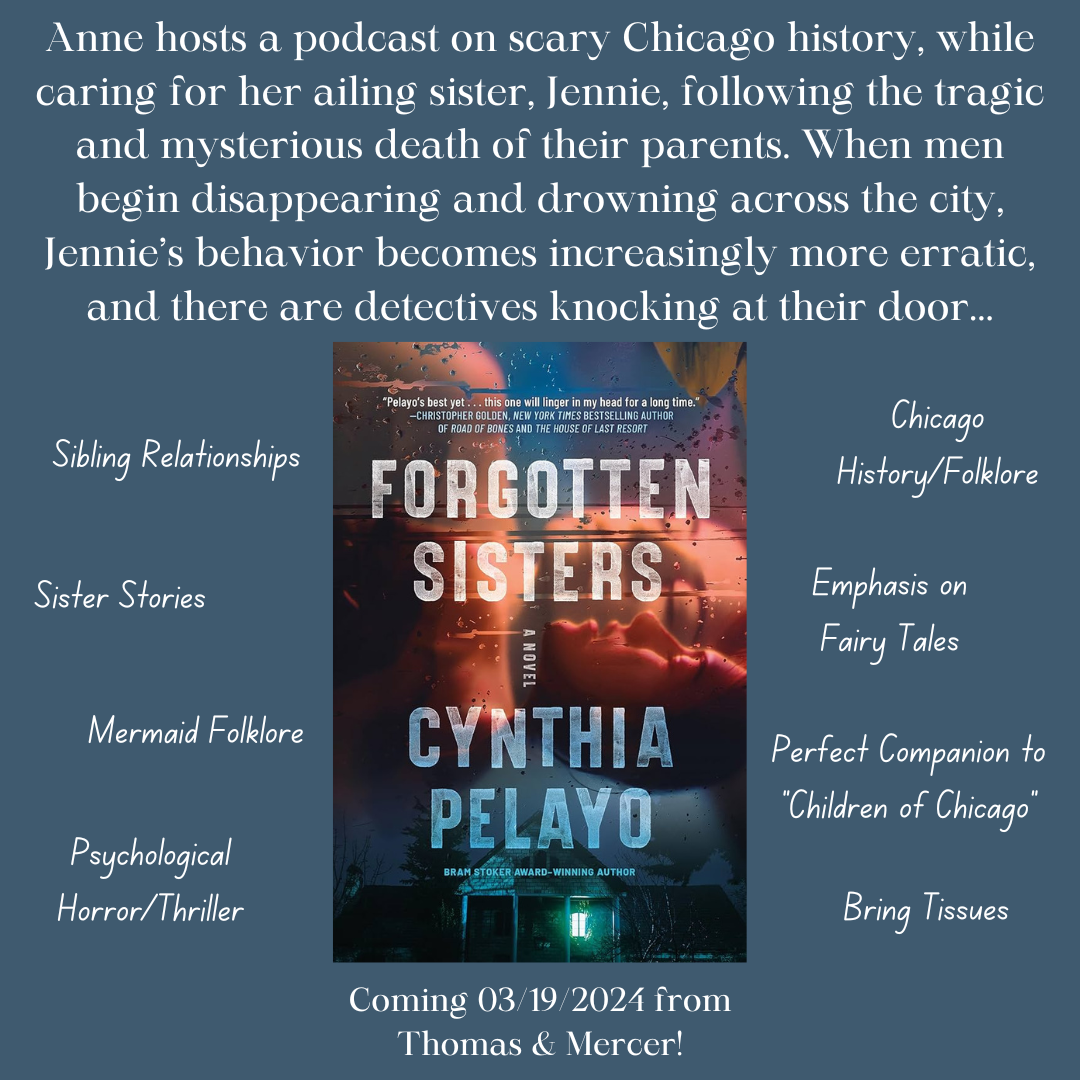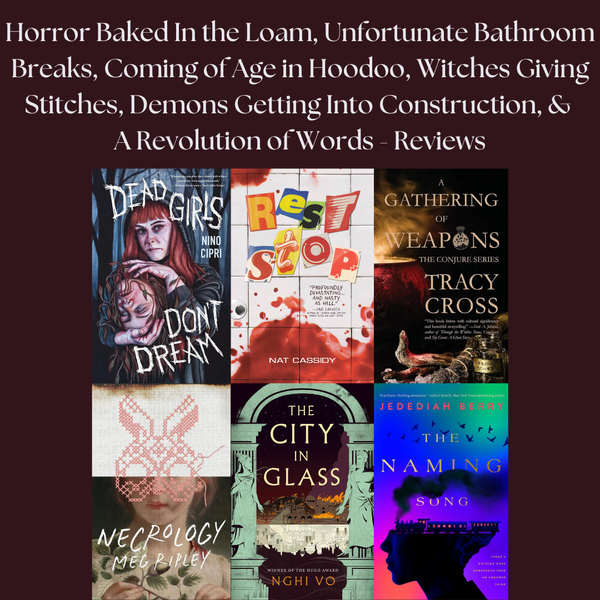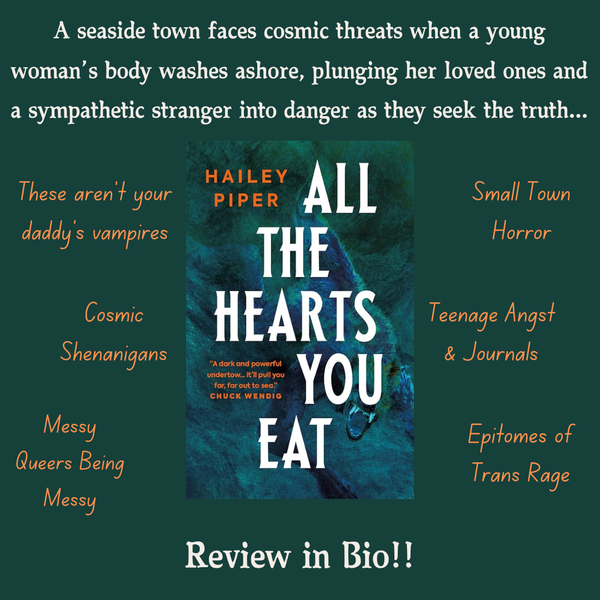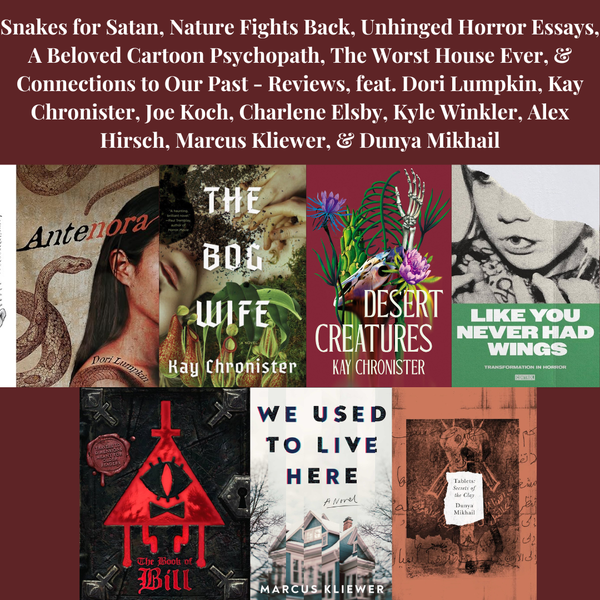Our Sisters Beneath the Waves... - A Review of Cynthia Pelayo's "Forgotten Sisters"
2024 with start off in a BIG way.

Last year, I experienced Cynthia Pelayo’s Children of Chicago for the first time. It’s climax, as well as the climax of in-universe sequel, The Shoemaker’s Magician, remain two of my absolute favorites in the contemporary roster of horror—if not of all time, if I’m being honest.
What becomes swiftly obvious to any reader lucky enough to find themselves in the thrall of a Cynthia Pelayo novel is her ability to deliver taught, brisk-paced thrillers with a slow-burn mastery of character development that you aren’t fully cognizant of until the final chapters have you weeping into your morning cereal. It is a skill and empathy that remains evident to friends and fans alike. A tool belt used with care by an ethereal carpenter whose craft leaves a delightfully daring signature.
Being that I recently re-acquainted myself with Children of Chicago, I wanted to crack into her upcoming novel, Forgotten Sisters, not realizing just how intricately this books exist alongside each other. Allow me to explain.
First, I want to thank Cynthia, as well as Thomas & Mercer, for sending me an early copy of the novel. Being the sweet angel of a human she is, Cynthia sent the book in a delicately wrapped parcel, accompanied by a lovely card sealed with her own unique stamp. So far, this has been the loveliest way I’ve received an advanced reader copy.
First Thing’s First! A Summary:
Forgotten Sisters tells the story of a young podcaster named Anna, who several years ago lost her parents in a tragic accident which left her sister, Jennie, traumatized and never quite the same. The two have been living in their childhood home ever since, having been sworn to do so by their loving grandmother. As Anna attempts to share her love of tragic and unnatural Chicago history with folks throughout the city, Jennie’s behavior and moods become more and more erratic, seemingly surrounding the fairy tales their grandmother used to impart to them.
As the lives of the sisters grow stranger and stranger, there is a new killer prowling the city streets, preying upon young men of the city, while leaving their bodies in the Chicago River. Two detectives find themselves back at the door of our central sisters, trying to solve these bizarre crimes. While Anna seeks to broaden her world outside of the house, Jennie warns of the darker world outside, frequently stepping out herself for evening walks her sister does not approve of. What is happening in this already grief stricken city and what place do Anna and Jennie hold within these events?
Being that this is a Cynthia Pelayo novel, folklore and fairy tales play a big role in the central plot and themes. It’s my favorite aspect of her writing because it melds some of my favorite genres and topics into compelling ground for terrifying and hard hitting stories. Forgotten Sisters is no different, yet it hinges more on its mystery elements than the outright horror of her previous two novels.
This is no way a criticism, as it puts the reality and fabulist aspects of this particular Chicago into contrasting arenas. The mysterious killings, as well as Jennie’s seemingly mad, fantastical rants and cryptic messages, challenge Anna, who herself considers so much about how myth and folklore play into our collective consciousness. Even the detectives along the periphery of the novel can’t make heads or tails of the world they’re coming up against.
I am not in the business of spoiling books. This is especially the case in Pelayo novels that, I feel, are best experienced with little knowledge going in. So much of what draws me to her brand of storytelling is trying to piece together what fairy tales, or elements, are being utilized or highlighted as I read. It’s a tool I feel is intentional on the author’s part. In trying to piece together clues, you’re leaving yourself open to the stunning sucker punch of an ending.
Why Misdirection By Way of Fairy Tales and Folklore is a Super Cool Tool in Storytelling
Throughout my life, I have been obsessed with mythology and folklore. As an neurodivergent child attempting to make sense of senseless systems, these stories borne of humanities fears and anxieties were a comfort to me. Cryptids and unexplained phenomenon often made more sense to me than sociopolitical behavior in the education world.
I’m sure that Cynthia Pelayo had many of these similar curiosities and hyperfixations, being a woman of color moving throughout a world that loved to bill itself as “home” for “one and all.” Regardless, she couches these interests within her narratives in a way that forces readers to broaden their awareness outwards. These myths exist and endure for a reason, and Pelayo presents these concepts in a broad and accessible way.
However, this is also a double-edged sword. While engaging with these myths and their wider cultural impact on our larger society, the author remains who they need to be, sneaking in the shadows between the lines while we consume the words. This sets the table for horror’s final course—the climax.
Pelayo knows how to write a damn good climax, but they’re never deployed for simple shock value. Like many storytellers, she knows how to gather every thread together as a means of bringing the message home. These final distillations, in the hands of our author, become something entirely unique within this particular genre. They often bring a sense of generational despair and trauma, but most importantly, especially considering the last two novels, they also offer a powerful hope as well.
The climax of these novels often feel explosive because we’ve been so focused on the characters and the deeper connections of history and myth, that the emotional wave that hits you staggers you in the best way possible. The tension is released, yet now you’re trying to pick up the pieces and put them together as the water beneath you continues to trip you up. It warrants a return to the book so you can glean clues you may have missed that initial time, thus enriching the story overall.
Why Forgotten Sisters is the Perfect Analog to Children of Chicago, as well as Pelayo’s Journey as a Whole
To conclude, I want to circle back around to my claim that Forgotten Sisters functions as a perfect analog to Pelayo’s debut novel, Children of Chicago.
Aside from obvious comparisons to plot, a family-focused narrative, as well as engaging with trauma in the face of experiences/entities more malevolent than ourselves, the upcoming novel additionally feels as though it builds upon what was introduced in Children and the ongoing universe she’s fostering.
Cynthia remains a strongly empathetic and earnest soul, and this hectic year of 2023 held many ups and downs with which she attended to. With Forgotten Sisters, there is a decided personality and growth evident within the characters—specifically Anna—that speaks to an author growing alongside them. This novel feels the most personal and powerful, setting the stage for her voice to resonate to a further, wider audience.
Her work focuses largely on family, in all of its complexities, and there is a prominent love present in this new novel. Pelayo holds grief, love, rage, and forgiveness within each chapter, creating a story that is ultimately as healing as it is heartbreaking.
Children of Chicago ends with a staggering tragedy, while also providing contemplative statements on police violence, guilt, and the never-ending cycles we can perpetuate within our pain. Forgotten Sisters flies alongside these messages, while holding a space for characters to grant themselves a form of forgiveness, letting the ghosts of the past rest and opening the windows to the warmth of hope.
It has remained an absolute pleasure and honor to witness many of my favorite writers flourish within their craft, and that goes double within this year. Even speaking with Cynthia reflects many of these themes, showing just how much this novel, and its creation, means to her.
I cannot wait to revisit Forgotten Sisters upon its release in March. There is so much depth and care within the words, and while it transcends horror in many ways—and could possibly be considered her “tamest” novel—these facts only embolden the story. This marks an inspiring new step in Cynthia Pelayo’s career, and if we’re lucky, the whole world will take notice too. Keep an eye open for updates regarding the new novel on everywhere Cynthia pops up, and if you haven’t read her work before this article…Well get to it! You have quite a few months to catch up.




